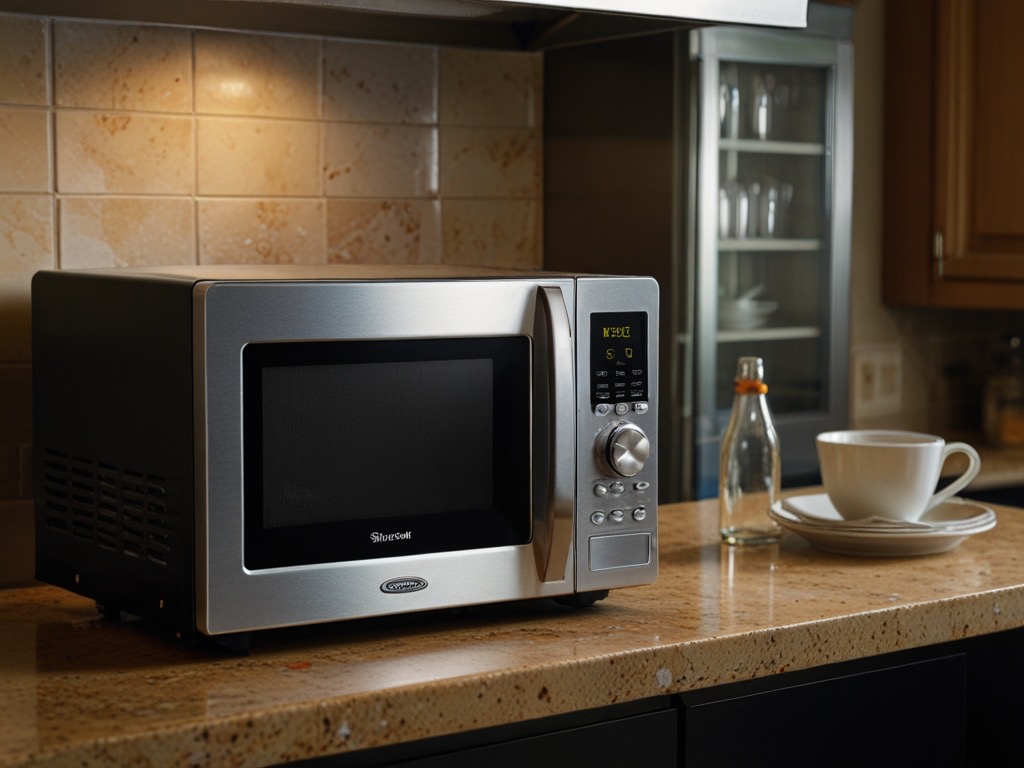Microwave ovens are a modern kitchen staple, offering convenience and speed for preparing meals. However, like any appliance, they require proper care to ensure longevity. By following some best practices, you can keep your microwave running efficiently for many years.
-
Regular Cleaning
⠀
The most important step in maintaining your microwave is regular cleaning. Food splatters, spills, and grease can accumulate inside, leading to unpleasant odors, unsanitary conditions, and even potential damage.
⠀
– Interior Cleaning: Wipe down the interior after every use with a damp cloth or sponge. For stubborn stains, heat a cup of water with lemon juice or vinegar for a few minutes, allowing the steam to loosen grime. Then, wipe the interior clean.
– Exterior Cleaning: Don’t neglect the exterior, especially the control panel. Use a soft, damp cloth with a mild detergent to clean the surface. Avoid using harsh chemicals or abrasive materials that could damage the finish or controls.
⠀
-
Use Microwave-Safe Containers
⠀
Using the right containers is crucial for both safety and the longevity of your microwave. Only use dishes and containers labeled as microwave-safe.
⠀
– Avoid Metal: Never place metal objects, including aluminum foil, inside the microwave. Metal can cause sparks, leading to damage or even fires.
– Mind Plastic: Not all plastics are microwave-safe. Some can melt or release harmful chemicals when heated. Stick to containers labeled microwave-safe, and avoid using plastic wraps unless they are specifically designed for microwave use.
⠀
-
Cover Your Food
⠀
Covering your food when heating it in the microwave not only helps to cook it more evenly but also prevents splatters that can cause a mess inside your microwave. Use a microwave-safe lid, plate, or microwave cover to shield your food. This simple practice can significantly reduce the frequency of deep cleanings and minimize the risk of food particles getting into the microwave’s components.
⠀
-
Avoid Overheating
⠀
Microwaves are powerful, and overheating food can lead to smoke, odors, and potential damage to the appliance. To prevent this, always follow recommended cooking times and power settings.
⠀
– Monitor Food: Don’t leave the microwave unattended while in use. Overheating can occur quickly, especially with foods like popcorn or liquids.
– Use Power Levels Wisely: Not all foods need to be cooked on high power. Adjusting the power level can help cook food more evenly and prevent overheating.
⠀
-
Ensure Proper Ventilation
⠀
Microwaves need adequate ventilation to prevent overheating. Ensure that the vents are not blocked and that the microwave has enough space around it for air circulation.
⠀
– Check the Vents: Regularly inspect the vents to make sure they are free from dust, grease, and other debris.
– Placement: Ensure your microwave is placed in a location that allows for proper ventilation, typically with a few inches of space on all sides.
-
Keep the Door Seals Clean and Intact
⠀
The door seals or gaskets are critical for the microwave’s efficiency and safety. They keep the microwave’s energy inside, allowing for efficient cooking and preventing leaks.
⠀
– Regular Inspection: Check the door seals for cracks, splits, or signs of wear. If you notice any damage, it’s essential to get them replaced immediately.
– Cleaning: Wipe the seals regularly with a damp cloth to remove any food particles or residue that could interfere with a proper seal.
⠀
-
Avoid Slamming the Door
⠀
While it might seem trivial, slamming the microwave door can cause damage to the door seals and the latch, leading to inefficient cooking or safety issues. Always close the door gently to ensure it remains in good working condition.
⠀
-
Schedule Regular Maintenance
⠀
Even with the best care, microwaves benefit from professional maintenance. Regular check-ups can identify and address minor issues before they become significant problems.
⠀
– Professional Inspection: Have a professional inspect your microwave periodically, especially if it’s older or if you notice any changes in performance.
– Address Issues Promptly: If you notice any unusual noises, smells, or a decline in performance, it’s time to call in the experts.
⠀
By following these best practices, you can extend the life of your microwave oven and ensure it continues to function efficiently. Regular cleaning, proper use of containers, and avoiding overheating are simple steps that make a big difference. However, if your microwave does start showing signs of wear or if you need a professional inspection, don’t hesitate to reach out for help.
⠀
For expert maintenance and repairs, contact Home Appliance Service Center today. Our experienced technicians can ensure your microwave stays in top shape, saving you time and money in the long run. Don’t wait for a breakdown – schedule your service now!
⠀
Contact us
 619-928-5000
619-928-5000  Request Service
Request Service 
